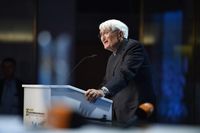Europe stands at a critical crossroads, as the philosophical insights of Jürgen Habermas urge a reevaluation of collective military commitments. In a recent contribution to the Süddeutsche Zeitung, titled "Für Europa," Habermas emphatically advocated for the rearmament of European Union (EU) states, warning that without strengthened military capacities, the EU could lose its political relevance in a rapidly changing geopolitical landscape. This statement comes against the backdrop of increasing tensions between the EU and the United States, particularly highlighted by President Donald Trump’s controversial foreign policy decisions.
Habermas, a noted philosopher celebrated for his contributions to political theory, pointed to the ongoing war in Ukraine as indicative of the broader implications of this discord. He stated, "The member countries of the European Union must strengthen and consolidate their military forces, or they will not count politically in a geopolitically dynamic and disintegrating world." His warnings come at a time when reliance on U.S. support is being questioned due to shifting American appetites towards transatlantic relationships.
Addressing the ramifications of Trump's approach to Russia, Habermas expressed concern that the U.S. stance might undermine the humanitarian support being provided to Ukraine, despite the legal justifications underpinning such aid. He emphasized that European nations can justify their involvement based on international law, yet their success ultimately hinges on Trump's unilateral foreign policy.
In his critique, he did not shy away from targeting former German Chancellor Angela Merkel, current Chancellor Olaf Scholz, and their perceived shortcomings in fostering deeper European integration. According to Habermas, both leaders have displayed ignorance and inactivity concerning the long-standing calls from France to unify military efforts across Europe. He proclaimed that these challenges fall squarely on the shoulders of Friedrich Merz, the likely successor as Chancellor, who must hold the daunting task of navigating this complex landscape.
Yet, Habermas also warned against the dangers of a unilateral military buildup by Germany. He cautioned that concentrating military capabilities within Germany's borders without proper coordination could lead to a distortion of power dynamics in Europe. "What would become of a Europe where the most populous state emerges as a military superpower unbound by constitutional obligations to a joint European defense and foreign policy?" he questioned, reinforcing the need for collective responsibility and action.
This cautiously optimistic view was met with mixed responses from the academic community. Historian Bert Hoppe responded critically, suggesting that while Habermas recognized the urgent need for rearmament, he simultaneously dismissed the actual threats posed by Russia. Hoppe articulated his concerns, stating, "Habermas remains loyal to his brand of argumentation, but he runs into conflicts with realistic assessments. What should this European military force actually be used for?"
Hoppe's line of reasoning pointed to a contradiction within Habermas' call for a European military force, arguing that it lacks a clear purpose. He noted, "It is somewhat distressing to watch Habermas, who once held such intellectual stature, seemingly oblivious to the reality that he shares arguments with Trump, his new arch-nemesis." Hoppe's sentiments were echoed by other intellectual figures, who voiced their frustration in response to the philosophical grounding of Habermas' propositions.
This dialogue is not isolated. Not long ago, the historian Egon Flaig also commented on the ramifications of the European-American rift regarding defense policies. Flaig had previously called for a willingness to make sacrifices within European nations, particularly in light of the ongoing conflict in Ukraine. He underscored the idea that the value citizens place on political freedom directly correlates with their willingness to sacrifice for their nation.
Reflecting on Habermas’ assertions, Flaig critiqued his opinions expressed in the 2005 essay collection "Zwischen Naturalismus und Religion," where he challenged the appropriateness of sacrificing for "foreign and anonymous fellow citizens". Flaig remarked that this notion marks a stark departure from the tradition of republican thinking, arguing that values exist only when individuals are prepared to defend them actively.
Jürgen Habermas remains a pivotal figure in contemporary philosophy, not only for his examination of how human communication shapes rationality but also for his sweeping influence stemming from the Frankfurt School, where he merges ideas from Marxism, linguistic philosophy, and American pragmatism. As Europe grapples with the implications of military rearmament and the geopolitical shifts precipitated by Trump's presidency, Habermas' latest reflections challenge the EU to enhance its common defense mechanisms while simultaneously advocating for deeper political integration.




